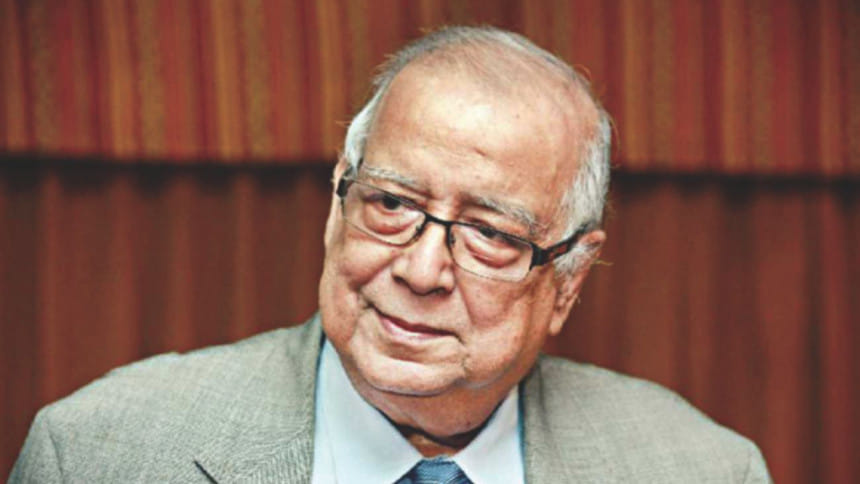Faruq Choudhury – A mentor for life

Faruq Ahmed Choudhury was very close to my heart. Though he was a 'big' man in terms of his stature, he communicated with us like a friend and an elder brother. I admired him, loved him and respected him. I had the opportunity to work with him for about 10 years during his tenure as an advisor of BRAC's Chairperson, Sir F.H. Abed. He joined BRAC on March 1, 1992 and left on December 12, 2006. However, he was not only an adviser to the chairperson but also to all of us in BRAC. Whenever someone wanted advice, they would talk to him and he would embrace everyone with grace.
We had the privilege to call him 'Faruq Bhai'. After his long work in the government as a successful bureaucrat and diplomat, he initially did not like everyone addressing him as bhai at BRAC. He once asked me, "What kind of an organisational culture is this; everyone, starting from the service staff, executives, directors, address me or Mr. Abed as bhai?" As time passed, he got used to it and eventually accepted and enjoyed the endearment.
Faruq Bhai and Abed Bhai had lunch together almost every day in the office of the chairperson. These daal-bhaat lunches were very informal. I would look at them and wonder how they both cherished that simple lunch! However, important organisational decisions were also taken in these meetings. Sometimes, I had the honour to participate in these lunches. From these informal meetings, I learned many things. For example, how these two top leaders of BRAC discussed issues, national, international and BRAC related, occasionally seeking my opinion, and then decide on certain important issues on organisational matters.
I remember once when I raised the issue of all levels of personnel, including directors, falling in line while getting into the elevator in the morning. The reason for discussing this issue was because I was and still am against the VIP-syndrome in our culture, and believe that values are created and examples set by the top leaders in an organisation. Faruq Bhai supported me and we agreed on the principle and Abed Bhai instructed me to implement the measure. I did and some top executives first resisted the initiative, but ultimately it became an acceptable norm.
Faruq Bhai was fairly informal when communicating with his juniors. I am sure this was not the case when he was a Foreign Secretary or an Ambassador! He used to pop into our rooms, have a cup of tea and an informal chat. Everyone in the office knew that he was Abed Bhai's right hand, but he had befriended us in such a manner that it was easy to have constructive discussions with him. We also used to have many such interesting and relevant sessions in Faruq Bhai's room.
I used to sit on the 19th floor of BRAC Centre, one room away from Faruq Bhai's. Whenever I had any problem, I would discuss it with him and he would always provide purposeful guidance. I also learned how to write good English from him. His choice of words and expressions was exceptional and he was a master at writing official correspondences. He also had an extraordinary grasp over the Bangla language. I always enjoyed reading his writings penned in precise and meticulous Bangla. In some of his books like Desh Deshantor and Farzanar Chithi, he wrote about his travel experience, the political history of Bangladesh and his experience with Bangabandhu Sheikh Mujibur Rahman. His books provided us with a deep insight into Bangladesh's politics and history. I enjoyed reading them and learned many things about the intricacies of politics, history, democracy and diplomacy.
Faruq Bhai loved good food. Whenever there was a party at BRAC, he would offer his suggestions to the menu and his choice of dishes was impeccable. We had also attended dinners at his home. He would instruct his chef on what to cook and the food on the table was usually something unique, from a global cuisine, and it always satisfied our taste buds.
I remember once, BRAC was running a disaster relief programme in Kutubdia, most possibly in the late 1990s. Faruq Bhai and Abed Bhai had visited the programme, supervising the implementation of the programme in Kutubdia. At one point, Faruq Bhai suggested, "Have you tried porota with sweet milk tea in Kutubdia? Don't miss it!" During my next visit, I did have the meal he recommended, and it was simply incredible. Thank you Faruq Bhai, I will never forget that taste!
Faruq Bhai had a tremendous grasp of languages. His knowledge and ability to communicate in Bengali, English and French was flawless. He also spoke Chinese and had encouraged me to learn the language, which I did, and we would exchange pleasantries in Chinese.
What I most liked about Faruq Bhai was his very secular mindset and remarkable sense of humour. He would always tell us, "Be kind to people. Treat everyone equally as human beings, regardless of their economic background or religion. Remember, you can be tough without being harsh". Great lessons of life.
I can never forget Faruq Bhai. He was one of my wisest and most down-to-earth mentors. I will always cherish this one advice he gave me: He told me, "Salehuddin, don't let everything affect you to the core of your heart. If you do, you will suffer. Take things calmly and serenely, and remember, time is the best healer". Faruq Bhai, we will always miss you.
The writer is former Pro-Vice Chancellor of BRAC University and Executive Deputy Director of BRAC.

 For all latest news, follow The Daily Star's Google News channel.
For all latest news, follow The Daily Star's Google News channel. 



Comments